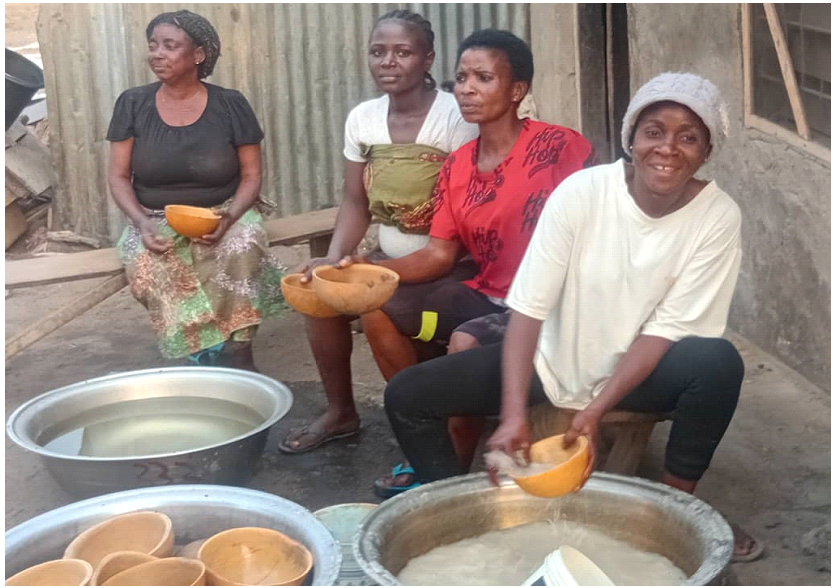
HARDSHIP: BURUKUTU FLOORS BEER IN MAKURDI
By Armstrong Tseaa, Makurdi
As the prices of food and beverages are soaring daily with the prices of beer even increasing in a hundred-fold. Lovers of beer are fast seeking alternatives in the consumption of burukutu, popularly known as bkt. Our market survey has shown that a bottle of beer, on the average goes for between one N1000 and 1,500 in Makurdi. This has in a way, given credence to the teeming customers ditching their regular beer joints for bkt not just as a replacement but a suitable option.
Burukutu is a locally brewed alcohol made from millet and guinea corn. It is brewed in the same manner as Umqombothi which the South African singer and songwriter, Yvonne Chaka Chaka, of blessed memory elevated in her song of the same title. Burukutu has different names based on how it is blended. Among the Tiv of Benue State, it is hundred percent ‘hyolave”-strong alcoholic, ‘lou’- when, it is non-alcoholic. It is also known as ‘Aho-pue, niongo-awanga and achinkonkon’.
It is a daily tonic for many people across Nigeria, but with the rising patronage from the low to the high in the society, it has won the singular title of a delicious brew.
Bkt has a long history that dates back to colonial times. Many, believe drinking it in the morning serves as a morning meal in disguise because of it rich nutrients and creamy nature.
It is also a known fact that, burukutu is almost found in the mammy markets of military barracks. It is also a prominent feature on the tables of key celebrations like marriages, traditional leaders’ installations, new yam festivals etc.
To Mr. Terna Demmen:, ‘burukutu is nutritious and creamy. With a five litre container going for two thousand naira, one can share with about ten friends. We are bonded socially when drinking it. Moreover, it is cheaper than a bottle of beer that cannot be shared among many friends.’
Contributing in the same manner, Comrade Bako noted that, ‘burukutu is like food or food supplement, it is a unifying drink. It is our drink for ages.’ ‘We are proud of our traditional drink. Those who drink beer might be waiting for Zeva that is being produce somewhere for Benue State. We hope it should be affordable to the average person. It should not be costly. We are not even seeing Zeva around in Benue.’
Dr. Michael Tihir has this to say: ‘Bako invited me to hang out with him and I propose we should come take burukutu that is our own and is not expensive.’
“We were happy with the launch of Zeva, a new beer from Benue on a contract production elsewhere with a limited circulation. Meanwhile, we are savouring our favourite (burukutu), that a five litre goes for two thousand naira’, Terna Igbaya stated.
The Transmitter also discovered that burukutu joints are full of banters and merry-making, they are also avenues where people get a bit of trendy issues in the rumour- mills there.
Local politics is discussed at such joints and grassroot politicians reach out to the people to canvas for their votes. Mr. Terver told our correspondent that: ‘Hon. Christopher Terngu Abari, a former member, Benue State House of Assembly did campaign largely in burukutu joints and we overwhelmingly voted him for Makurdi South State Constituency in 2007’.
Mrs Hembafan Yina, a burukutu seller at Wurukum Market in Makurdi told The Transmitter that, she started the business in 2015 and has never regretted. ‘I became a widow and was looking for a means of livelihood. I couldn’t raise the capital for other businesses but here in burukutu business, traders are ever ready to sell the millet, fire wood and water on credit. So, here am I deep into the business.’
Women are mostly involved in the production and sales of burukutu. Economically, Benue women contribute significantly to trade and other commercial activities but struggle with limited access to credit and job opportunities in formal sectors; hence, their involvement in burukutu business. Many have made it big through this burukutu business.
Therefore, ensuring women’s economic empowerment by providing access to financial facilities, resources, and creating enabling environments for women in Nigeria to thrive will go a long way in developing the local economy and providing job opportunities for the youths who will be engaged in the farming of these cereals; sorghum, millet and guinea corn.
Secondly, making burukutu a great brand with customised cans or bottles will boost it selling chances: since it serves as a suitable option to the expensive bottles of beer. This will thrill the consumers and increase the demand for burukutu, cultivation of the cereals used for its production and a trickle-down economic effect on the states’ economy.
The daily tonic is consumed within a twenty-four hours’ period, nonetheless; it could stay for as long as three days when kept in a cold environment but not at a freezing point. Further research can be conducted on how to preserve the drink for a longer period than it is now.
Therefore, investing in the production, preservation and distribution of burukutu on a larger scale will provide a novel approach for job creation and shall be a money-spinning alternative for investors, governments and other business interests.



